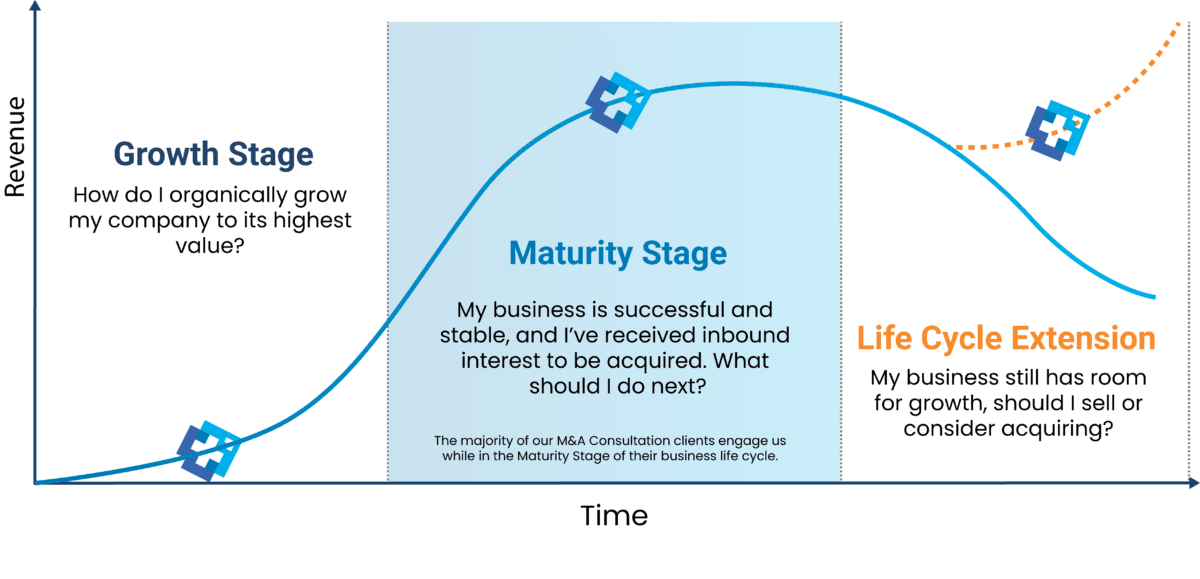
Timing is crucial when deciding to sell your healthcare business. Timing consists of: 1) the life cycle of your company and 2) the current macroeconomic environment, within which your company is operating. Selling during a period of maturity, stability, and managed growth, maximizes the valuation. Identifying where your company is in its life cycle and analyzing the data trends is termed the “fundamentals” of your business. We also consider the timing within the market, and consider the environmental “headwinds” or “tailwinds” affecting your business from the outside. Even in fluctuating economic markets, quality healthcare businesses continue to attract strong interest from buyers. This article outlines the optimal timing strategies for selling your healthcare business based on fundamentals and the market environment, highlighting the importance of market trends, financial stability, and business credibility.

The Ideal Time to Sell Your Healthcare Business
Understanding your company fundamentals and how they will be received in the current marketplace.
Determining the right time to sell your healthcare business can significantly impact the outcome of the sale. While various factors contribute to this decision, selling during a period of maturity with stable growth offers the most advantageous position in the market. A buyer wants to be confident in the recurring revenue, patient census, and the personnel commitment. These stabilized fundamentals with even slight growth make the target company more valuable. If a mature company with sound fundamentals finds itself in a market with positive economic conditions the valuation can be even higher. These economic conditions and business quality are key considerations of timing of you sale.
Growth Periods: Capitalizing on Momentum
We need to ensure that your company has enough maturity where the growth and stability are reliable even through market headwinds. What can not happen is going to market and your business have a decline in fundamentals.
The best time to sell your healthcare business is when it is experiencing sustained and reliable growth. Buyers are willing to pay a premium for businesses that demonstrate strong performance and potential for continued success. Here’s why growth matters:
- Increased Valuation: A mature and growing business is more likely to command a higher valuation. Buyers are attracted to companies that show upward momentum because it suggests that the business will continue to generate increasing revenues and profits. This growth trend provides confidence that investors’ influence will complement growth and yield a significant return on invested capital (ROIC) when they sell the business down range.
- There are external factors such as deregulation, reimbursement, labor markets, which buyers will take into account. But the enterprise value will be primarily based on the fundamentals such as management, caregiver retention, billing, SG&A efficiencies, and how the company navigates its environmental factors (see above). In a company there is Bottom Up, which is management. This is considered supply-side economics. Top down is more based on government and larger cap interventions. If we see an economy favoring SMBs, like the upcoming administration, that is a positive Macroeconomic setting for a fundamentally well run company. This will add value, as well, because the growth can be sustained and predictable into the future.
- Buyer Confidence: When your healthcare business is stable, with reliable growth, it inspires confidence among potential buyers. A positive performance trajectory indicates effective management and demand for services, suggesting a viable business model— desirable attributes in the healthcare sector.
- Market Timing: Selling during market optimism can provide leverage to the valuation. Ideally, there are economic tailwinds for your business, providing an environment for expanding your services. However, even in markets with headwinds, we see certain healthcare segments thrive.
Economic Conditions: Selling with Tailwinds vs. Headwinds
When preparing your company for a sale and conducting a preliminary valuation, it is essential to understand the broader economic conditions.
Healthcare businesses, particularly those of high quality, tend to perform well regardless of broader economic conditions. However, understanding how economic cycles influence buyer behavior can help you time your sale more effectively.
- Optimistic Markets: In an economic environment with Tailwinds, there is generally more capital available and buyers are more optimistic about the future. This positive environment can lead to higher valuations as buyers are eager to invest in businesses that show promise. Selling during an up market, especially when your business is growing, can result in competitive bidding and premium offers.
- Down or Uncertain Markets: While down markets might seem like a less favorable time to sell, high-quality healthcare businesses still attract buyers. Investors looking for stable, recession-resistant assets often turn to the healthcare sector during economic downturns. If your business is financially stable, with consistent cash flow and a strong management team, it can still achieve a favorable enterprise value in spite of challenging economic times.
Quality Fundamentals: The Hallmarks of a Desirable Healthcare Business
Business Valuation assesses the fundamental data of the company first and foremost.
Regardless of market conditions or growth trends, the underlying quality of your healthcare business is what ultimately drives buyer interest and valuation. Key qualities include:
- Financial Stability: Buyers are drawn to businesses with strong financials, including consistent revenue streams and healthy profit margins. A stable, cash-flowing business reduces perceived risk and enhances valuation.
- Reputation: A well-established operator in the healthcare market, with strong patient ratings and consistent unabated reimbursement, signals trust and reliability. Buyers value businesses with strong clinical reputation, as it indicated by caregiver and patient loyalty..
- Leadership and Staff: A skilled and experienced leadership team, along with tenured staff, is a significant benefit. It assures buyers that the business can continue to thrive under the current management without the need to transition the ownership. Compliance knowledge, operational experience, and consistent best practices will support future growth and add significantly to company value when it comes time to sell your healthcare business.
- Expansion Potential: Businesses that present clear opportunities for expansion are highly attractive to buyers. Whether it’s expanding on current services (horizontal growth), entering new services or markets (vertical growth), or finding efficiencies in operations and administration (controls), the potential for improved performance can significantly increase your business’s value.
Conclusion: Timing Your Sale for Maximum Value
Being able to sell your healthcare business at the right time requires a careful assessment of your fundamentals, growth trajectory, economic conditions, and the intangible qualities of your business. Selling a mature financially stable, reputable, and well-managed business can maximize your chances of achieving a premium valuation. M&A Healthcare Advisors are here to guide you through the process, ensuring that your business is positioned perfectly for a successful sale.

